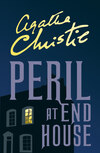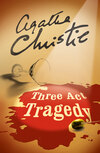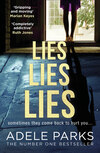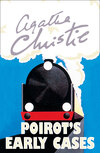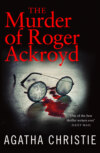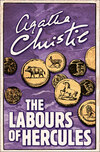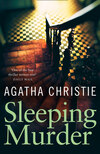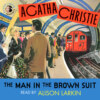Читать книгу: «Sad Cypress», страница 3
CHAPTER 3
Your Aunt had second stroke last night No cause immediate anxiety but suggest you should come down if possible Lord.
Immediately on receipt of the telegram Elinor had rung up Roddy, and now they were in the train together bound for Hunterbury.
Elinor had not seen much of Roddy in the week that had elapsed since their visit. On the two brief occasions when they had met, there had been an odd kind of constraint between them. Roddy had sent her flowers—a great sheaf of long stemmed roses. It was unusual on his part. At a dinner they had had together he had seemed more attentive than usual, consulting her preferences in food and drink, being unusually assiduous in helping her on and off with her coat. A little, Elinor thought, as though he were playing a part in a play—the part of the devoted fiancé…
Then she had said to herself:
‘Don’t be an idiot. Nothing’s wrong… You imagine things! It’s that beastly brooding, possessive mind of yours.’
Her manner to him had been perhaps a shade more detached, more aloof than usual.
Now, in this sudden emergency, the constraint passed, they talked together naturally enough.
Roddy said:
‘Poor old dear, and she was so well when we saw her the other day.’
Elinor said:
‘I do mind so terribly for her. I know how she hated being ill, anyway, and now I suppose she’ll be more helpless still, and she’ll simply loathe that! One does feel, Roddy, that people ought to be set free—if they themselves really want it.’
Roddy said:
‘I agree. It’s the only civilized thing to do. You put animals out of their pain. I suppose you don’t do it with human beings simply because, human nature being what it is, people would get shoved off for their money by their fond relations—perhaps when they weren’t really bad at all.’
Elinor said thoughtfully:
‘It would be in the doctors’ hands, of course.’
‘A doctor might be a crook.’
‘You could trust a man like Dr Lord.’
Roddy said carelessly:
‘Yes, he seems straightforward enough. Nice fellow.’
Dr Lord was leaning over the bed. Nurse O’Brien hovered behind him. He was trying, his forehead puckered, to understand the slurred sounds coming from his patient’s mouth.
He said:
‘Yes, yes. Now, don’t get excited. Take plenty of time. Just raise this right hand a little when you mean yes. There’s something you’re worried about?’
He received the affirmatory sign.
‘Something urgent? Yes. Something you want done? Someone sent for? Miss Carlisle? And Mr Welman? They’re on their way.’
Again Mrs Welman tried incoherently to speak. Dr Lord listened attentively.
‘You wanted them to come, but it’s not that? Someone else? A relation? No? Some business matter? I see. Something to do with money? Lawyer? That’s right, isn’t it? You want to see your lawyer? Want to give him instructions about something?
‘Now, now—that’s all right. Keep calm. Plenty of time. What’s that you’re saying—Elinor?’ He caught the garbled name. ‘She knows what lawyer? And she will arrange with him? Good. She’ll be here in about half an hour. I’ll tell her what you want and I’ll come up with her and we’ll get it all straight. Now, don’t worry any more. Leave it all to me. I’ll see that things are arranged the way you want them to be.’
He stood a moment watching her relax, then he moved quietly away and went out on the landing. Nurse O’Brien followed him. Nurse Hopkins was just coming up the stairs. He nodded to her. She said breathlessly:
‘Good evening, Doctor.’
‘Good evening, Nurse.’
He went with the two of them into Nurse O’Brien’s room next door and gave them their instructions. Nurse Hopkins would remain on overnight and take charge with Nurse O’Brien.
‘Tomorrow I’ll have to get hold of a second resident nurse. Awkward, this diphtheria epidemic over at Stamford. The nursing homes there are working short-handed as it is.’
Then, having given his orders, which were listened to with reverent attention (which sometimes tickled him), Dr Lord went downstairs, ready to receive the niece and nephew who, his watch told him, were due to arrive at any minute now.
In the hall he encountered Mary Gerrard. Her face was pale and anxious. She asked:
‘Is she better?’
Dr Lord said:
‘I can ensure her a peaceful night—that’s about all that can be done.’
Mary said brokenly:
‘It seems so cruel—so unfair—’
He nodded sympathetically enough.
‘Yes, it does seem like that sometimes. I believe—’
He broke off.
‘That’s the car.’
He went out into the hall. Mary ran upstairs.
Elinor exclaimed as she came into the drawing-room:
‘Is she very bad?’
Roddy was looking pale and apprehensive.
The doctor said gravely:
‘I’m afraid it will be rather a shock to you. She’s badly paralysed. Her speech is almost unrecognizable. By the way, she’s definitely worried about something. It’s to do with sending for her lawyer. You know who he is, Miss Carlisle?’
Elinor said quickly:
‘Mr Seddon—of Bloomsbury Square. But he wouldn’t be there at this time of the evening, and I don’t know his home address.’
Dr Lord said reassuringly:
‘Tomorrow will be in plenty of time. But I’m anxious to set Mrs Welman’s mind at rest as soon as possible. If you will come up with me now, Miss Carlisle, I think together we shall be able to reassure her.’
‘Of course. I will come up at once.’
Roddy said hopefully:
‘You don’t want me?’
He felt faintly ashamed of himself, but he had a nervous dread of going up to the sick-room, of seeing Aunt Laura lying there inarticulate and helpless.
Dr Lord reassured him promptly.
‘Not the least need, Mr Welman. Better not to have too many people in the room.’
Roddy’s relief showed plainly.
Dr Lord and Elinor went upstairs. Nurse O’Brien was with the patient.
Laura Welman, breathing deeply and stertorously, lay as though in a stupor. Elinor stood looking down on her, shocked by the drawn, twisted face.
Suddenly Mrs Welman’s right eyelid quivered and opened. A faint change came over her face as she recognized Elinor.
She tried to speak.
‘Elinor…’ The word would have been meaningless to anyone who had not guessed at what she wanted to say.
Elinor said quickly:
‘I’m here, Aunt Laura. You’re worried about something? You want me to send for Mr Seddon?’
Another of those hoarse raucous sounds. Elinor guessed at the meaning. She said:
‘Mary Gerrard?’
Slowly the right hand moved shakily in assent.
A long burble of sound came from the sick woman’s lips. Dr Lord and Elinor frowned helplessly. Again and again it came. Then Elinor got a word.
‘Provision? You want to make provision for her in your will? You want her to have some money? I see, dear Aunt Laura. That will be quite simple. Mr Seddon will come down tomorrow and everything shall be arranged exactly as you wish.’
The sufferer seemed relieved. The look of distress faded from that appealing eye. Elinor took her hand in hers and felt a feeble pressure from the fingers.
Mrs Welman said with a great effort:
‘You—all—you…’
Elinor said: ‘Yes, yes, leave it all to me. I will see that everything you want is done!’
She felt the pressure of the fingers again. Then it relaxed. The eyelids drooped and closed.
Dr Lord laid a hand on Elinor’s arm and drew her gently away out of the room. Nurse O’Brien resumed her seat near the bed.
Outside on the landing Mary Gerrard was talking to Nurse Hopkins. She started forward.
‘Oh, Dr Lord, can I go in to her, please?’
He nodded.
‘Keep quite quiet, though, and don’t disturb her.’
Mary went into the sick-room.
Dr Lord said:
‘Your train was late. You—’ He stopped.
Elinor had turned her head to look after Mary. Suddenly she became aware of his abrupt silence. She turned her head and looked at him inquiringly. He was staring at her, a startled look in his face. The colour rose in Elinor’s cheeks.
She said hurriedly:
‘I beg your pardon. What did you say?’
Peter Lord said slowly:
‘What was I saying? I don’t remember. Miss Carlisle, you were splendid in there!’ He spoke warmly. ‘Quick to understand, reassuring, everything you should have been.’
The very faintest of sniffs came from Nurse Hopkins.
Elinor said:
‘Poor darling. It upset me terribly seeing her like that.’
‘Of course. But you didn’t show it. You must have great self-control.’
Elinor said, her lips set very straight:
‘I’ve learnt not—to show my feelings.’
The doctor said slowly:
‘All the same the mask’s bound to slip once in a while.’
Nurse Hopkins had bustled into the bathroom. Elinor said, raising her delicate eyebrows and looking full at him:
‘The mask?’
Dr Lord said:
‘The human face is, after all, nothing more nor less than a mask.’
‘And underneath?’
‘Underneath is the primitive human man or woman.’
She turned away quickly and led the way downstairs.
Peter Lord followed, puzzled and unwontedly serious.
Roddy came out into the hall to meet them.
‘Well?’ he asked anxiously.
Elinor said:
‘Poor darling. It’s very sad to see her… I shouldn’t go, Roddy—till—till—she asks for you.’
Roddy asked:
‘Did she want anything—special?’
Peter Lord said to Elinor:
‘I must be off now. There’s nothing more I can do for the moment. I’ll look in early tomorrow. Goodbye, Miss Carlisle. Don’t—don’t worry too much.’
He held her hand in his for a moment or two. He had a strangely reassuring and comforting clasp. He looked at her, Elinor thought, rather oddly as though—as though he was sorry for her.
As the door shut behind the doctor, Roddy repeated his question.
Elinor said:
‘Aunt Laura is worried about—about certain business matters. I managed to pacify her and told her Mr Seddon would certainly come down tomorrow. We must telephone him first thing.’
Roddy asked:
‘Does she want to make a new will?’
Elinor answered:
‘She didn’t say so.’
‘What did she—?’
He stopped in the middle of the question.
Mary Gerrard was running down the stairs. She crossed the hall and disappeared through the door to the kitchen quarters.
Elinor said in a harsh voice:
‘Yes? What is it you wanted to ask?’
Roddy said vaguely:
‘I—what? I’ve forgotten what it was.’
He was staring at the door through which Mary Gerrard had gone.
Elinor’s hands closed. She could feel her long, pointed nails biting into the flesh of her palms.
She thought:
‘I can’t bear it—I can’t bear it…it’s not imagination…it’s true… Roddy—Roddy I can’t lose you…’
And she thought:
‘What did that man—the doctor—what did he see in my face upstairs? He saw something… Oh, God, how awful life is—to feel as I feel now. Say something, fool. Pull yourself together!’
Aloud she said, in her calm voice:
‘About meals, Roddy. I’m not very hungry. I’ll sit with Aunt Laura and the nurses can both come down.’
Roddy said in alarm:
‘And have dinner with me?’
Elinor said coldly:
‘They won’t bite you!’
‘But what about you? You must have something. Why don’t we dine first, and let them come down afterwards?’
Elinor said:
‘No, the other way’s better.’ She added wildly, ‘They’re so touchy, you know.’
She thought:
‘I can’t sit through a meal with him—alone—talking—behaving as usual…’
She said impatiently:
‘Oh, do let me arrange things my own way!’
CHAPTER 4
It was no mere housemaid who wakened Elinor the following morning. It was Mrs Bishop in person, rustling in her old-fashioned black, and weeping unashamedly.
‘Oh, Miss Elinor, she’s gone…’
‘What?’
Elinor sat up in bed.
‘Your dear aunt. Mrs Welman. My dear mistress. Passed away in her sleep.’
‘Aunt Laura? Dead?’
Elinor stared. She seemed unable to take it in.
Mrs Bishop was weeping now with more abandon.
‘To think of it,’ she sobbed. ‘After all these years! Eighteen years I’ve been here. But indeed it doesn’t seem like it…’
Elinor said slowly:
‘So Aunt Laura died in her sleep—quite peacefully… What a blessing for her!’
Mrs Bishop wept.
‘So sudden. The doctor saying he’d call again this morning and everything just as usual.’
Elinor said rather sharply:
‘It wasn’t exactly sudden. After all, she’s been ill for some time. I’m just so thankful she’s been spared more suffering.’
Mrs Bishop said tearfully that there was indeed that to be thankful for. She added:
‘Who’ll tell Mr Roderick?’
Elinor said:
‘I will.’
She threw on a dressing-gown and went along to his door and tapped. His voice answered, saying, ‘Come in.’
She entered.
‘Aunt Laura’s dead, Roddy. She died in her sleep.’
Roddy, sitting up in bed, drew a deep sigh.
‘Poor dear Aunt Laura! Thank God for it, I say. I couldn’t have borne to see her go on lingering in the state she was yesterday.’
Elinor said mechanically:
‘I didn’t know you’d seen her?’
He nodded rather shamefacedly.
‘The truth is, Elinor, I felt the most awful coward, because I’d funked it! I went along there yesterday evening. The nurse, the fat one, left the room for something—went down with a hot-water bottle, I think—and I slipped in. She didn’t know I was there, of course. I just stood a bit and looked at her. Then, when I heard Mrs Gamp stumping up the stairs again, I slipped away. But it was—pretty terrible!’
Elinor nodded.
‘Yes, it was.’
Roddy said:
‘She’d have hated it like hell—every minute of it!’
‘I know.’
Roddy said:
‘It’s marvellous the way you and I always see alike over things.’
Elinor said in a low voice:
‘Yes it is.’
He said:
‘We’re both feeling the same thing at this minute: just utter thankfulness that she’s out of it all…’
Nurse O’Brien said:
‘What is it, Nurse? Can’t you find something?’
Nurse Hopkins, her face rather red, was hunting through the little attaché-case that she had laid down in the hall the preceding evening.
She grunted:
‘Most annoying. How I came to do such a thing I can’t imagine!’
‘What is it?’
Nurse Hopkins replied not very intelligibly:
‘It’s Eliza Rykin—that sarcoma, you know. She’s got to have double injections—night and morning—morphine. Gave her the last tablet in the old tube last night on my way here, and I could swear I had the new tube in here, too.’
‘Look again. Those tubes are so small.’
Nurse Hopkins gave a final stir to the contents of the attaché-case.
‘No, it’s not here! I must have left it in my cupboard after all! Really, I did think I could trust my memory better than that. I could have sworn I took it out with me!’
‘You didn’t leave the case anywhere, did you, on the way here?’
‘Of course not!’ said Nurse Hopkins sharply.
‘Oh, well, dear,’ said Nurse O’Brien, ‘it must be all right?’
‘Oh, yes! The only place I’ve laid my case down was here in this hall, and nobody here would pinch anything! Just my memory, I suppose. But it vexes me, if you understand, Nurse. Besides, I shall have to go right home first to the other end of the village and back again.’
Nurse O’Brien said:
‘Hope you won’t have too tiring a day, dear, after last night. Poor old lady. I didn’t think she would last long.’
‘No, nor I. I daresay Doctor will be surprised!’
Nurse O’Brien said with a tinge of disapproval:
‘He’s always so hopeful about his cases.’
Nurse Hopkins, as she prepared to depart, said:
‘Ah, he’s young! He hasn’t our experience.’
On which gloomy pronouncement she departed.
Dr Lord raised himself up on his toes. His sandy eyebrows climbed right up his forehead till they nearly got merged in his hair.
He said in surprise:
‘So she’s conked out—eh?’
‘Yes, Doctor.’
On Nurse O’Brien’s tongue exact details were tingling to be uttered, but with stern discipline she waited.
Peter Lord said thoughtfully:
‘Conked out?’
He stood for a moment thinking, then he said sharply:
‘Get me some boiling water.’
Nurse O’Brien was surprised and mystified, but true to the spirit of hospital training, hers not to reason why. If a doctor had told her to go and get the skin of an alligator she would have murmured automatically, ‘Yes, Doctor,’ and glided obediently from the room to tackle the problem.
Roderick Welman said:
‘Do you mean to say that my aunt died intestate—that she never made a will at all?’
Mr Seddon polished his eyeglasses. He said:
‘That seems to be the case.’
Roddy said:
‘But how extraordinary!’
Mr Seddon gave a deprecating cough.
‘Not so extraordinary as you might imagine. It happens oftener than you would think. There’s a kind of superstition about it. People will think they’ve got plenty of time. The mere fact of making a will seems to bring the possibility of death nearer to them. Very odd—but there it is!’
Roddy said:
‘Didn’t you ever—er—expostulate with her on the subject?’
Mr Seddon replied drily:
‘Frequently.’
‘And what did she say?’
Mr Seddon sighed.
‘The usual things. That there was plenty of time! That she didn’t intend to die just yet! That she hadn’t made up her mind definitely, exactly how she wished to dispose of her money!’
Elinor said:
‘But surely, after her first stroke—?’
Mr Seddon shook his head.
‘Oh, no, it was worse then. She wouldn’t hear the subject mentioned!’
Roddy said:
‘Surely that’s very odd?’
Mr Seddon said again:
‘Oh, no. Naturally, her illness made her much more nervous.’
Elinor said in a puzzled voice:
‘But she wanted to die…’
Polishing his eyeglasses, Mr Seddon said:
‘Ah, my dear Miss Elinor, the human mind is a very curious piece of mechanism. Mrs Welman may have thought she wanted to die; but side by side with that feeling there ran the hope that she would recover absolutely. And because of that hope, I think she felt that to make a will would be unlucky. It isn’t so much that she didn’t mean to make one, as that she was eternally putting it off.
‘You know,’ went on Mr Seddon, suddenly addressing Roddy in an almost personal manner, ‘how one puts off and avoids a thing that is distasteful—that you don’t want to face?’
Roddy flushed. He muttered:
‘Yes, I—I—yes, of course. I know what you mean.’
‘Exactly,’ said Mr Seddon. ‘Mrs Welman always meant to make a will, but tomorrow was always a better day to make it than today! She kept telling herself that there was plenty of time.’
Elinor said slowly:
‘So that’s why she was so upset last night—and in such a panic that you should be sent for…’
Mr Seddon replied:
‘Undoubtedly!’
Roddy said in a bewildered voice:
‘But what happens now?’
‘To Mrs Welman’s estate?’ The lawyer coughed. ‘Since Mrs Welman died intestate, all her property goes to her next of kin—that is, to Miss Elinor Carlisle.’
Elinor said slowly.
‘All to me?’
‘The Crown takes a certain percentage,’ Mr Seddon explained.
He went into details.
He ended:
‘There are no settlements or trusts. Mrs Welman’s money was hers absolutely to do with as she chose. It passes, therefore, straight to Miss Carlisle. Er—the death duties, I am afraid, will be somewhat heavy, but even after their payment, the fortune will still be a considerable one, and it is very well invested in sound gilt-edged securities.’
Elinor said:
‘But Roderick—’
Mr Seddon said with a little apologetic cough:
‘Mr Welman is only Mrs Welman’s husband’s nephew. There is no blood relationship.’
‘Quite,’ said Roddy.
Elinor said slowly:
‘Of course, it doesn’t much matter which of us gets it, as we’re going to be married.’
But she did not look at Roddy.
It was Mr Seddon’s turn to say, ‘Quite!’
He said it rather quickly.
‘But it doesn’t matter, does it?’ Elinor said.
She spoke almost pleadingly.
Mr Seddon had departed.
Roddy’s face twitched nervously.
He said:
‘You ought to have it. It’s quite right you should. For heaven’s sake, Elinor, don’t get it into your head that I grudge it to you. I don’t want the damned money!’
Elinor said, her voice slightly unsteady:
‘We did agree, Roddy, in London that it wouldn’t matter which of us it was, as—as we were going to be married…?’
He did not answer. She persisted:
‘Don’t you remember saying that, Roddy?’
He said:
‘Yes.’
He looked down at his feet. His face was white and sullen, there was pain in the taut lines of his sensitive mouth.
Elinor said with a sudden gallant lift of the head:
‘It doesn’t matter—if we’re going to be married… But are we, Roddy?’
He said:
‘Are we what?’
‘Are we going to marry each other?’
‘I understood that was the idea.’
His tone was indifferent, with a slight edge to it. He went on:
‘Of course, Elinor, if you’ve other ideas now…’
Elinor cried out:
‘Oh, Roddy, can’t you be honest?’
He winced.
Then he said in a low, bewildered voice:
‘I don’t know what’s happened to me…’
Elinor said in a stifled voice:
‘I do…’
He said quickly:
‘Perhaps it’s true, that. I don’t after all, quite like the idea of living on my wife’s money…’
Elinor, her face white, said:
‘It’s not that… It’s something else…’ She paused, then she said, ‘It’s—Mary, isn’t it?’
Roddy murmured unhappily:
‘I suppose so. How did you know?’
Elinor said, her mouth twisting sideways in a crooked smile:
‘It wasn’t difficult… Every time you look at her—it’s there in your face for anyone to read…’
Suddenly his composure broke.
‘Oh, Elinor—I don’t know what’s the matter! I think I’m going mad! It happened when I saw her—that first day—in the wood…just her face—it’s—it’s turned everything upside down. You can’t understand that…’
Elinor said:
‘Yes, I can. Go on.’
Roddy said helplessly:
‘I didn’t want to fall in love with her… I was quite happy with you. Oh, Elinor, what a cad I am, talking like this to you…’
Elinor said:
‘Nonsense. Go on. Tell me…’
He said brokenly:
‘You’re wonderful… Talking to you helps frightfully. I’m so terribly fond of you, Elinor! You must believe that. This other thing is like an enchantment! It’s upset everything: my conception of life—and my enjoyment of things—and—all the decent ordered reasonable things…’
Elinor said gently:
‘Love—isn’t very reasonable…’
Roddy said miserably:
‘No…’
Elinor said, and her voice trembled a little:
‘Have you said anything to her?’
Roddy said:
‘This morning—like a fool—I lost my head—’
Elinor said:
‘Yes?’
Roddy said:
‘Of course she—she shut me up at once! She was shocked. Because of Aunt Laura and—of you—’
Elinor drew the diamond ring off her finger. She said:
‘You’d better take it back, Roddy.’
Taking it, he murmured without looking at her:
‘Elinor, you’ve no idea what a beast I feel.’
Elinor said in her calm voice:
‘Do you think she’ll marry you?’
He shook his head.
‘I’ve no idea. Not—not for a long time. I don’t think she cares for me now; but she might come to care…’
Elinor said:
‘I think you’re right. You must give her time. Not see her for a bit, and then—start afresh.’
‘Darling Elinor! You’re the best friend anyone ever had.’ He took her hand suddenly and kissed it. ‘You know, Elinor, I do love you—just as much as ever! Sometimes Mary seems just like a dream. I might wake up from it—and find she wasn’t there…’
Elinor said:
‘If Mary wasn’t there…’
Roddy said with sudden feeling:
‘Sometimes I wish she wasn’t… You and I, Elinor, belong. We do belong, don’t we?’
Slowly she bent her head.
She said:
‘Oh, yes—we belong.’
She thought:
‘If Mary wasn’t there…’
Бесплатный фрагмент закончился.
Начислим
+20
Покупайте книги и получайте бонусы в Литрес, Читай-городе и Буквоеде.
Участвовать в бонусной программе



